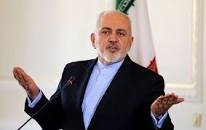Zarif condemns medicine embargo on Iran

TEHRAN- Foreign Minister Mohammad Javad Zarif said on Wednesday that those countries which seemingly support the 2015 nuclear deal are unfortunately preventing exports of medicines for special patients in Iran.
“As the issue is necessary and important, I am telling to the Europeans another time that Iran does not expect a country which has voiced support for the JCPOA (the Joint Comprehensive Plan of Action) to prevent a pharmaceutical company from exporting medicines for patients suffering from special diseases,” Zarif said on the sidelines of cabinet session with a reference to his visit to Sweden.
“Wound-dressing for the children suffering from butterfly disease can’t be produced in all countries. Of course, Iran experienced good progress but it is being produced in low quantity. A few number of pharmaceutical companies can produce it,” the minister stated.
“A Swedish company that has been exporting it (wound-dressing for butterfly patients) to Iran, is now unable to continue its trade with us due to the U.S. sanctions and oppressive behavior. I have to remind the Europeans that it is very good that you have decided to join INTEX, but as the Americans are claiming that medicines and humanitarian services are not included in sanctions list, you Europeans do not embark on imposing medicine embargo on Iran,” Zarif said.
Butterfly disease, scientifically called Epidermolysis bullosa (EB), is a hereditary genetic disease characterized by different degrees of skin and mucosal fragility. The pathogenesis of this rare disease involves mutation in skin structural proteins resulting in four major types of EB, including EB simplex, junctional EB, dystrophic EB and Kindler’s syndrome based on ultrastructural mutation level in skin and mucosa.
These patients suffer from many physical complications including infection, upper and lower extremities deformities, severe itching, widespread skin ulcerations that make them susceptible to skin cancer, severe chronic constipation, dysphasia and odynophagia due to narrowing of the esophagus. Dental problems, oral mucosal involvements, urinary tract dysfunction and kidney fibrosis are other complications.
Zarif further voiced satisfaction over a positive move by 6 European countries that joined the Instrument in Support of Trade Exchanges (INSTEX) that is supposed to ease trade with Iran regardless of the U.S. unilateral sanctions on the countries and companies which try to trade with Tehran.
Belgium, Denmark, Finland, the Netherlands, Norway, and Sweden issued a joint statement on Friday announcing becoming shareholders of INSTEX.
In a letter on Friday, Iranian Health Minister Saeed Namaki said that the U.S. harsh sanctions against his country had gravely affected imports of medicine.
"We have been through a very hard year due to the sanctions and supply of drugs, medical equipment and treatment of patients, particularly the special and incurable patients, is an extraordinarily difficult job," Namaki said.
In his letter to Director-General of the World Health Organization (WHO) Tedros Adhanom Ghebreyesus, the Iranian health minister had reminded that the U.S. was obstructing the import of medications for patients of his country, adding that the WHO and the United Nations (UN) were responsible to adopt a measure against Washington’s inhumane moves.
"The brave Iranian people are being victimized by plots and economic sanctions that have been imposed by the U.S. administration," Namaki said in a letter to Ghebreyesus, adding that international organizations should not remain silent about Washington's cruel economic sanctions that also target Iran's food and medicine, warning of the adverse consequences of the bans.
The health minister said Washington claims such sanctions do not include medicine, medical equipment and food, and they are meant to suspend exchanges in international banking systems. However, he argued, the behavior that the White House has adopted only goes in line with its efforts to intentionally stop imports of essential goods for the needy.
The minister emphasized that major obstacles put by the U.S. in the way of Iran's import of medicine and medical equipment have had a negative impact on the treatment of many Iranian patients.
"By imposing sanctions on the Iranian nation, the U.S. has not only committed economic terrorism but in practice it has carried out a crime against humanity," Namaki pointed out.
As the main organization in charge of providing universal public health coverage, the WHO must not remain indifferent to this important issue, the Iranian minister said.
He added that officials of the United Nations must be held accountable for the adoption of measures in violation of law.
MJ/PA
